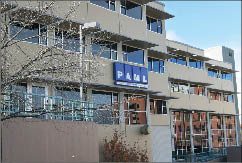
Home » PAML to swell after equity deal
PAML to swell after equity deal
Medical lab sells stake to Denver group for $37 million

November 12, 2009
Pathology Associates Medical Laboratories says it expects to expand its national footprint significantly, and likely will add more employees here, after its parent sold a $37.1 million stake in the Spokane for-profit company to a big Denver-based Catholic hospital group.
PAML, as the lab is known here, is owned by Seattle-based Providence Health & Services, which has agreed to sell a 25 percent equity share of PAML to Catholic Health Initiatives, a Denver health-care system with facilities in 20 states. Providence also owns Sacred Heart Medical Center & Children's Hospital, Holy Family Hospital, and dozens of other health-care installations in the Northwest. Catholic Health Initiatives operates 78 hospitals and 40 long-term, assisted-living, and residential facilities, among other holdings.
Tom Tiffany, PAML's president and CEO, says CHI is the second-largest Catholic health-care system in the nation and is strategically located to give the Spokane-based lab a platform to become a national provider of lab services, as has been its goal. In a partnership that stems from the equity agreement, PAML will be able to locate regional laboratory joint ventures in or near CHI facilities.
"CHI brings us an excellent partner and needed capital to move east and expand. That portends well for Spokane for continued growth for our lab business here," Tiffany says.
PAML already is a regional provider of lab services. It is a partner with 22 hospitals in five hospital-based laboratory joint ventures in Washington, Idaho, and Utah. In those arrangements, it teams up with hospitals to form limited liability corporations, sharing in the cost and profit of those ventures. It also offers a la carte services to hospitals that perform their own testing. It employs about 1,300 people, including 800 in Spokane.
"We anticipate PAML, in the Spokane-based portion of employees, will increase fairly consistently over the next several years as we bring these ventures forward," says Noel Maring, PAML's senior vice president and chief marketing officer.
PAML's first lab in partnership with CHI is expected to open in February in a hospital in Little Rock, Ark., says Maring. PAML anticipates opening another joint venture in Denver in May, and up to 10 such ventures in the next two years at or near select CHI hospitals around the country, he says.
Most of the administrative office functions of those new ventures, including billing, finance, and certain information-technology functions, will be performed largely or completely in Spokane, resulting in increased hiring here, though PAML hasn't determined how many new positions will be added overall, he says.
Maring says teaming up with Catholic Health Initiatives will propel PAML's continued growth by allowing it to replicate its successful regional business model.
"What's happened is that PAML has grown dramatically throughout the Northwest with the joint-venture model," he says. "The business model has been very successful. We have grown and feel we have the infrastructure now to become a national competitor."
Says Tiffany, "It's not like the usual investor where they want to come in and do their investment and turn it around in five years. This is more like an annuity investment as I see it—they want to see their investment grow."
Maring says PAML's expected expansion also will improve the efficiency and scope of lab testing for Spokane-area hospitals and physicians.
"Our physicians and hospitals and communities around here will have better turnaround times for testing we're performing here in town. For example, there may be tests we are performing three days a week that will go to five days a week," he says.
Maring says PAML estimates that about 10 percent of the testing done through the new joint ventures will be what are called "esoteric," or highly complex, tests that include genetic testing, much of which will be performed in Spokane. PAML also provides clinical and anatomical pathology testing.
"We will see additional volumes of esoteric testing come in to our lab that right now are not economically viable to perform but with the economies of scale we will be able to perform some of those," he says. He says likely several million dollars worth of esoteric testing that CHI currently sends out to other laboratories now will be directed to PAML instead.
Though he declines to disclose PAML's annual revenues, Maring says PAML's competitors are many times its size.
"And here's PAML, competing very effectively," he says.
PAML was founded in 1957, and provides a suite of lab services to health-care providers, including testing, strategic planning, billing, and information-technology services. It's a for-profit subsidiary of Providence Health & Services.
CHI is a national nonprofit health organization founded by a number of congregations of nuns, and now is overseen by 12 such congregations, including the Sisters of St. Francis of Philadelphia; the Sisters of Charity of Cincinnati; and the Franciscan Sisters of Little Falls, Minn. The nonprofit has annual revenues of $8.6 billion a year.
Latest News
Related Articles



